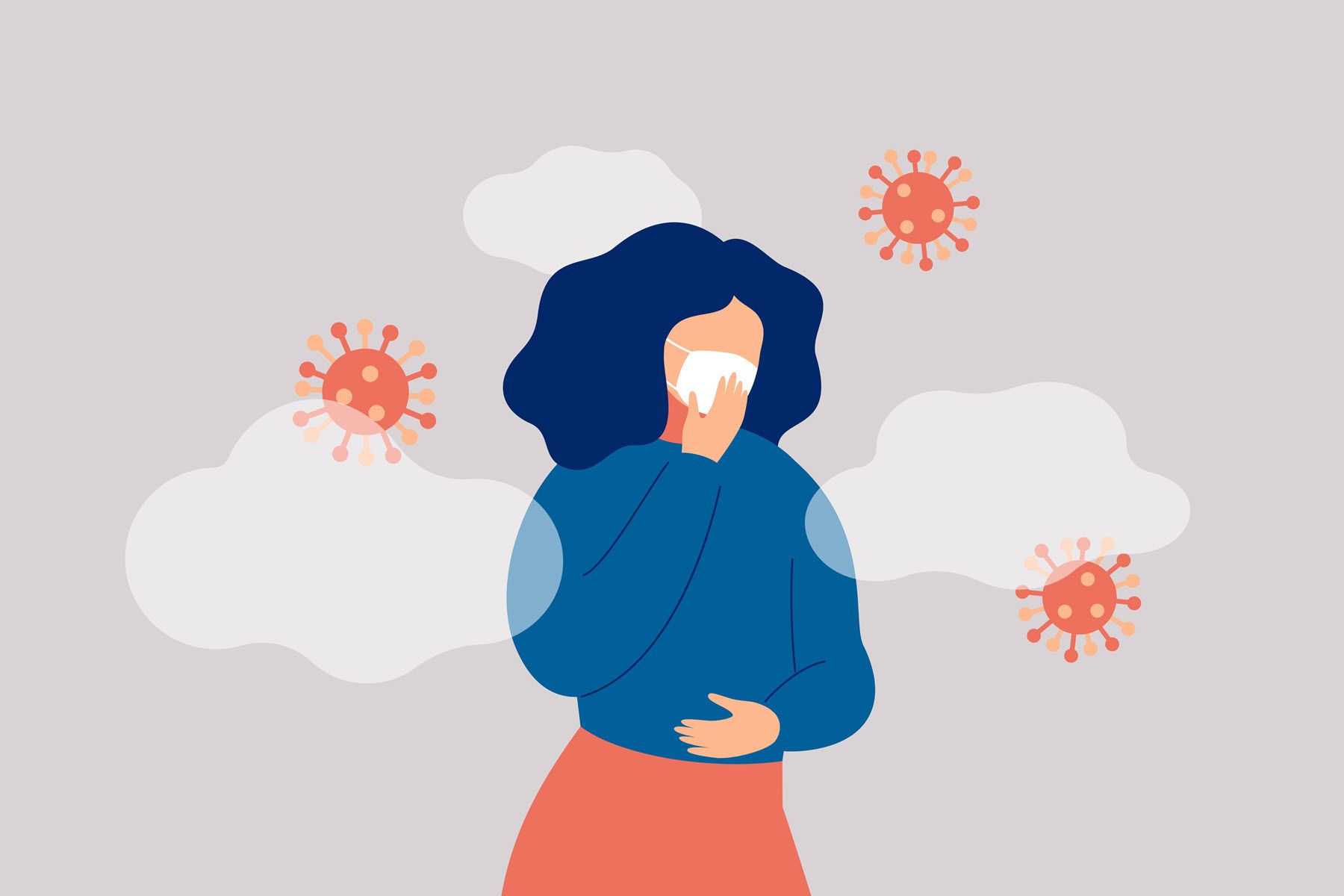June 15, 2021 — Morgan Tebeau has struggled with debilitating back pain all of her grownup life. The 38-year-old mom from Harrisonburg, VA, was recognized with degenerative disk illness when she was 18 years outdated. Her ache worsened throughout the COVID-19 pandemic as she postpone a lot wanted care — one thing a brand new Kaiser Household Basis survey discovered was extra widespread amongst ladies throughout the peak of the pandemic.
As a self-described outside fanatic and fitness specialist, Tebeau loves mountaineering, tenting, and mountaineering. She additionally owns an out of doors boot camp and leads a Fb health group known as Robust Mothers — a group for connecting ladies, sharing wellness, and serving to them with self-care, she says.
However this previous 12 months has been tough for Tebeau, who didn’t concentrate on her personal well being the best way she ought to have due to COVID-19.
“I used to be within the throes of transitioning my in-person health enterprise to a web based mannequin, and I had my daughter at house with me full-time. I felt like I couldn’t pull again from these duties to discover what was happening with my physique, and the pandemic made it even simpler to keep away from the vital self-care that I wanted,” she says
“Deep in COVID lockdown, I didn’t really feel that I might actually handle the pain in the best way I usually would have or maintain it as rapidly as I needed to.”
By the point Tebeau acquired to the physician, her well being had gotten a lot worse.
“My ache was undoubtedly at a ten. On a regular basis duties like laundry, carrying just about something, together with selecting up my daughter, had been out of the query. I used to be struggling to drive myself, as a result of the ache was distracting, and I used to be teaching my health shoppers in a neck brace. All of this was leaving me utterly drained bodily, mentally, and emotionally on the finish of the day.”
Her ache started final September, however she didn’t see a physician and have the correct exams till November. By then, Tebeau discovered she had two herniated disks, one in all which required surgical procedure.
The Kaiser survey discovered ladies extra prone to go with out well being care, in comparison with males, presumably leading to a better variety of ladies with extreme well being points after the pandemic is over.
Extra ladies have skipped preventive services similar to annual checkups and routine exams, at 38% and 26%, respectively, in addition to really useful exams or remedy, at 23% and 15%, respectively. This delay in care might end in extra extreme well being points down the street.
Based on the survey, extra ladies haven’t crammed a prescription, have reduce capsules in half, or have skipped doses of their medicines. And extra ladies report they may not get a physician’s appointment due to the pandemic.
Colin Haines, MD, is a spinal surgeon at Virginia Backbone Institute who treats Tebeau. He says it doesn’t shock him {that a} excessive charge of missed care is linked to the COVID pandemic. He witnessed this for himself at his personal apply and on the Virginia Backbone Institute Most sufferers who skipped out on care this previous 12 months had been ladies, he says.
“What we noticed on the peak of the pandemic was individuals had been scared to come back in, and for good purpose. They had been scared to see their physician they usually had been scared to go away the home due to the danger of the pandemic.”
These fears probably brought about non-COVID diseases, and folks ended up having worse signs, Haines says
“By the point that many sufferers lastly noticed me, the delay brought about their ache to spiral uncontrolled, requiring us to leap in and get them mounted, typically surgically, on a faster timeline than we usually would have needed to in the event that they obtained early remedy.”
For Tebeau, that is precisely what occurred.
“Morgan was actually attending to that time the place if we didn’t get her surgically mounted, that issues would have continued to worsen and that the weak point and ache in her arm may turn into everlasting. A whole lot of that, I imagine, was brought on by the truth that Morgan waited. She was fascinated by everybody else earlier than herself till she had an ‘aha’ second together with her daughter the place she stated, ‘Sufficient; if I’m not caring for myself, I’m not going to have the ability to take care of you or anybody else and never be capable to stay the energetic life I wish to.’”
His recommendation?
“Search assist sooner quite than later. It doesn’t imply you must rush off to the physician for each bruise you’ve got, but when one thing doesn’t really feel regular, to me that’s a serious set off.”
A Johns Hopkins survey revealed in JAMA Community Open discovered that 41% of U.S. adults skipped care between March and mid-July 2020. Many attributed it to the pandemic.
“We discovered that 60% of people who wanted an elective surgical procedure reported lacking that elective surgical procedure,” stated Kelly Anderson, PhD, from the Johns Hopkins Bloomberg College of Public Well being, who is without doubt one of the examine authors. They discovered 58% of people that wanted preventive care — for instance, cancer screenings — didn’t get it, and 46% of individuals getting psychological well being providers skipped appointments. And 15% of individuals reported skipping a number of doses of prescription treatment.
“Many people additionally didn’t search medical care for brand new, doubtlessly extreme well being points. In our survey, 51% of people who reported having a brand new well being challenge that they scored as extreme didn’t obtain take care of this challenge,” Anderson says.
She believes it’s essential for suppliers and well being insurers to work to reconnect individuals to the medical system.
“For instance, for a girl who sometimes wants a breast cancer screening who missed that throughout the COVID-19 pandemic, proactively reaching out to her to reschedule the screening,” she suggests
The outgoing president of the American Medical Affiliation, Susan Bailey, MD, says medical doctors have been involved from the start of the pandemic that sufferers weren’t coming to appointments for worry of COVID-19.
“I believe each doctor has skilled this slowdown, and we are attempting to get the message out very early on that it’s secure to go to the physician, that medical doctors are taking all of the precautions they’ll to guarantee that COVID will not be transmitted in a physician/hospital encounter,” she says. “Many individuals are simply nonetheless anxious to exit.”
Persevering with down this street of delaying care is perilous, says Bailey
“It may be very dangerous to your well being to place off wanted medical procedures and routine screenings to stop or at the very least detect illness early. … Not searching for take care of circumstances similar to diabetes, bronchial asthma, and youngsters’s immunizations places us susceptible to medical issues that didn’t should occur.”
And skipping out on essential well being care may very well be lethal.
“I would like sufferers to know that there’s actually no time like the current to get caught up on their well being care wants. Over 90% of physicians and greater than 80% of nurses have been immunized in opposition to COVID-19. Well being care services are very secure, they know learn how to shield you. In the event you’ve gotten immunized your self, and we hope you’ve got, you already know the danger of catching COVID-19 when going to the physician or getting a routine screening is vanishingly small. There’s no time like the current to get the medical care you want,” Bailey says.
Tebeau can attest to this.
“As a mom, typically the automated response is to push via ache and discomfort with a view to be the caretaker for others. We placed on our Superwoman cape and say, ‘I can deal with this.’”
However withholding self-care is rarely the reply and, in her case, it was nearly tragic, she says.
“We have to begin associating placing ourselves on the again burner with being a really harmful and harmful conduct,” she cautions. “Self-care is greater than bubble baths and brunch; it’s placing your well being on the high of your precedence record. You may’t be something good to anybody in your life if you’re damaged, in ache, or struggling emotionally.”






